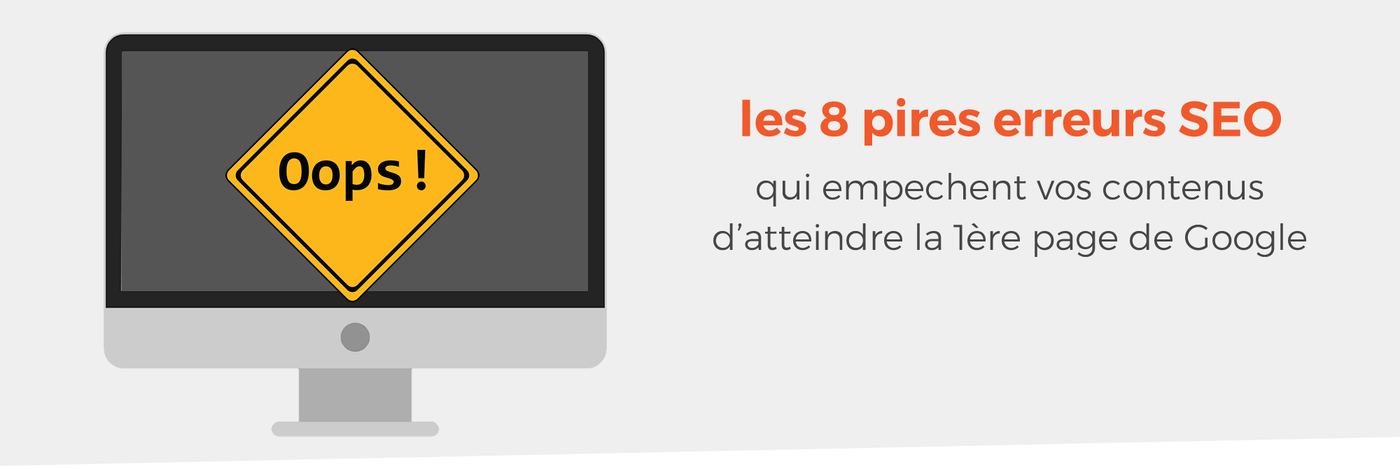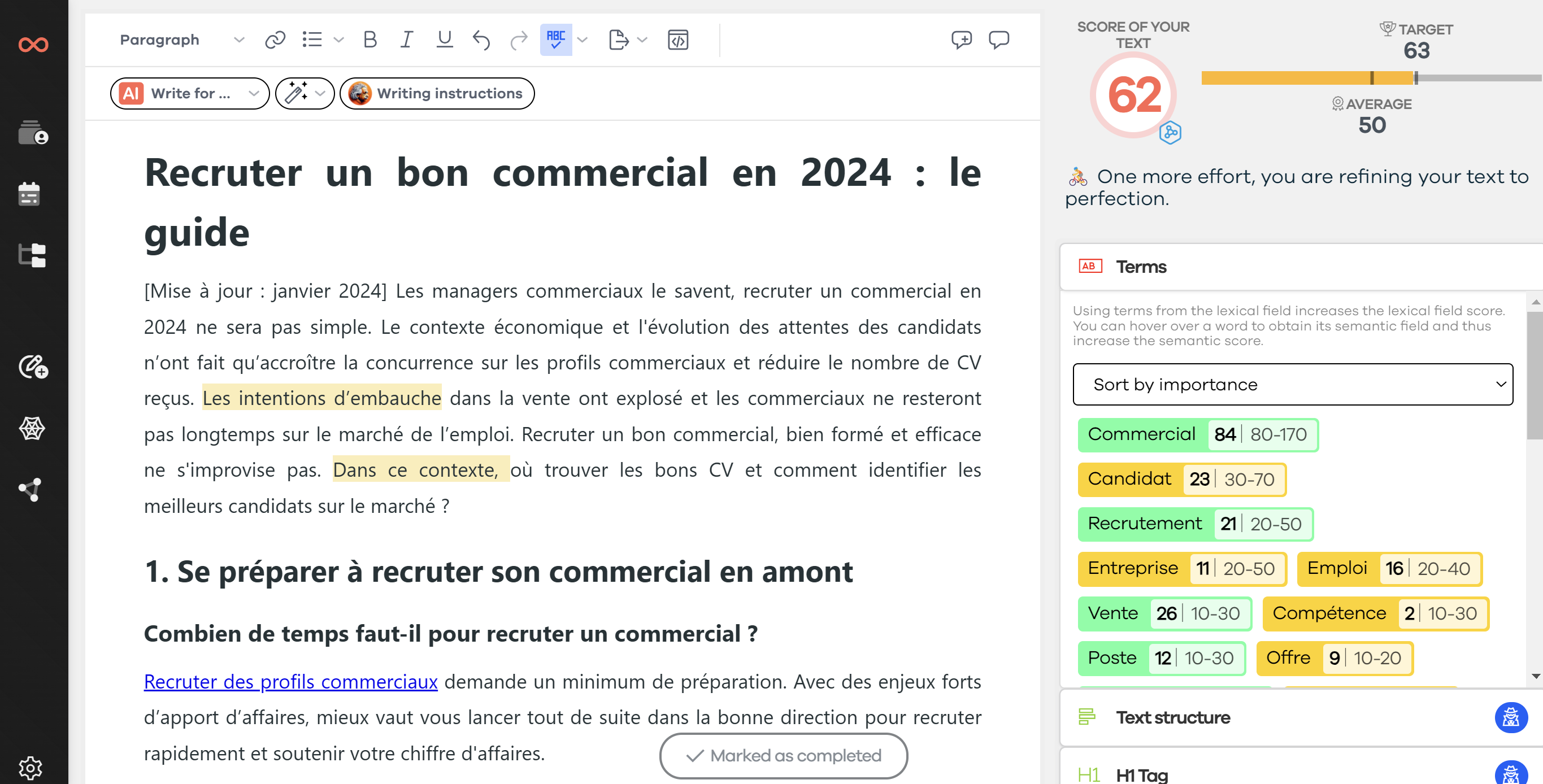> “I published my content a month ago, and still nothing is happening!”, “I optimized my page, how long do I have to wait?”
>
> Some of you ask me to review your content optimizations and website after using SEOQuantum. I've compiled in this article the SEO best practice mistakes that harm the visibility of your SEO content. First and foremost, take the time to check these few tips, as they can genuinely improve the positioning of your pages.
>
> I've made some natural SEO mistakes since I started. We all have. For anyone practicing SEO, the list of natural SEO mistakes is significant, rest assured. Unfortunately, even though these SEO errors are widely known, they are still rampant on most online businesses.
>
> Good natural SEO practices can make your content, page, and website even more visible. So, how to avoid SEO mistakes?
>
> To know exactly what SEO mistakes to avoid, you need to know what good SEO practices look like. Positive SEO techniques, also known as "white hat SEO" techniques, are the methods that will organically improve your pages' rankings on search engines.
>
> Discover without further ado the 8 worst SEO mistakes that people and businesses continue to make and what you can do to avoid them.
>
> ## 🚀 Quick read: summary of the 8 SEO mistakes to avoid at all costs
>
> To attract more visitors to your website, you need to please search engine indexing robots. This way, you'll have better positioning on the results pages, which will then improve your traffic. To achieve this, avoid making these 8 glaring mistakes with your SEO content!
>
> 1. Not having a content strategy
> 2. Not working on keywords
> 3. Not optimizing your content
> 4. Non-optimized URLs
> 5. Disregarding UX
> 6. Ignoring the mobile version of your website
> 7. Neglecting broken links
> 8. Not using GA and GSC
>
>
>
>
😶🌫️ 1. Not having a content strategy
>
> What is your content strategy? What is it? If you can't answer this question right away, the answer is that you don't have a content strategy, and it's also one of the biggest SEO mistakes. The fact is that SEO and content are inseparable.
>
> You need to have an active and responsive blog, indexed on targeted keywords, and maximum visibility; otherwise, your business or your client's business will suffer.
>
>
>
>
🫣 2. Not working on keywords
>
> Words are crucial for your communication.
>
> One of the biggest SEO mistakes to make is thinking that keywords don't matter. That is, writing just for the sake of writing. Internet users and search engines still use keywords to appreciate website content. How will they understand the purpose of your website if there are no words (keywords) to say it?
>
>

>
> Internet users use keywords in their search queries to find what they're looking for.
>
> Using the right keywords is the best way to maintain your brand's consistency while driving traffic to you. Conversely, using the wrong keywords will only confuse search engines and internet users.
>
> If you don't know which keywords to use for your website or your client's website, think about the nature of your site and what your business offers to those looking for you (refer again to your content strategy). Then use a tool like Google Keyword Planner or Yooda Insight to get ideas and monthly search volumes.
>
> ## 👨💻 3. Not optimizing your content
>
> Offering unique, comprehensive content that meets the search intent of the user is still the best way to generate organic traffic to you. The best brands always offer fresh, original, and relevant content.
>
> You need to have a "deep" content strategy to progress or maintain your SEO positions. Part of this content should contain at least 1,000 to 1,500 words to display some expertise for users and search engines.
>
>
>
>
😵💫 4. Non-optimized URLs
>
> Example of a non-optimized URL
> Example of an optimized URL
> 
>
> It's a good idea to have as many URLs as necessary to make your site relevant. Of course, the problem with URLs is that they are by default a series of letters, numbers, and symbols. It's essential for your visibility to make sure to optimize them.
>
> In terms of SEO mistakes, this may seem minor, but when you leave a URL too long and/or with a series of symbols and numbers, it won't help your positioning in search engines. If you take the URL and shorten it concisely with optimized keywords, it will make much more sense to search engines. For the more technical among you, enable the URL Rewriting option on your website.
>
> If you optimize all your URLs for each post and each page, search engines will have a much easier time crawling your site and discovering what you have to offer.
>
> ![]()
>
>
>
>
🤯 5. Disregarding User Experience (UX)
>
>

>
> UX, or user experience, is the cornerstone of SEO. Since 2018, SXO (Search Experience Optimization) has emerged and has now become essential.
>
> The user experience is quite explicit for SEO success; the user must be able to access your site quickly and ergonomically; the longer you retain them on the site, the better. How many times have you searched for information and the page's slow loading times forced you to give up and look on another site?
>
> Your users must have a positive experience or they will go elsewhere. Google even said in one of its posts, "Focus on the user, and everything else will follow".
>
> ## 😣 6. Ignoring mobile
>
> Whether you work for B2B or B2C, you can bet that most internet users use a mobile device (smartphone or tablet) to access your website. When you ignore this crucial audience, you do so at your own risk. That's why you need to understand the importance of mobile-friendly websites (responsive design), mobile sites, or native apps.
>
> When was the last time you wanted to search for information outside, then thought, "I'll keep this information in mind, do all the other things I need to do, then go home and sit at my desktop PC to find out about this information"?
>
> If you're like 100% of people with a smartphone or tablet, chances are you've never done it. The reason is that we want our information now. Google recently announced that its search algorithms now perform Mobile First indexing.
>
>
🤐 7. Neglecting broken links
>
> What is a broken link? It's a link that directs the user to a non-existent page. It's an SEO mistake to avoid, as it can really harm your content. Your content is then poorly linked or, worse, unfindable. You'd be surprised to learn how many sites have broken links.
>
> Of course, finding these broken links is another question entirely. The best way to know which of these links is broken is to perform a technical audit via a crawler. This audit will identify all the broken links that redirect users to a non-existent page.
>
> Once you know where your pages are, you should update these links to go to an existing page that is the target page you want. As for broken internal links, also consider doing a 301 redirect from the deleted page to improve a technical SEO factor on your site.
>
>
>
>
🤦♂️ 8. Not using Google Analytics and Google Search Console
>
>

>
> Perhaps the most common SEO mistake beginners continue to make is believing that the rules don't apply to them. Not using Google Analytics and other Google tools for webmasters will put you at a disadvantage. Google Analytics is excellent software for keeping an eye on engagement rates and keeping them on the rise.
>
> Here are some indicators that I monitor on various Google tools:
>
> Google Analytics, for your Google statistics:
>
> - Bounce rate of blog posts: maintaining or increasing engagement rate is a sign of quality. The bounce rate should be correlated with time spent.
> - Time spent: the time spent on the different pages of the site
> - Number of pages per visit
> - Acquisition channels: be sure to maintain a good balance between each channel
>
> Google Search Console will allow you to track your progress and help your website find its audience.
>
> - Indexing errors from the Google crawler
> - Keywords searched: allows you to see those searched by users and know if Google has understood the purpose of your site (are the keywords related to your activity or your client's?).
> - Optimizations to be made: to be found, you must be on the 1st page of Google. Take the keyword report and pull out the pages positioned between the 10th and 15th position to perform a semantic optimization.
>
>
🎬 Conclusion
>
> Optimizing your content is a crucial element for successfully ranking your pages on Google. Of course, other essential factors must be considered to offer a perfectly optimized site: technique and link building are the two other pillars not to be neglected.
>
> However, if you already avoid making these 8 SEO mistakes with your content, you will have an advantage over your direct competitors. Also, remember to optimize your images and main tags properly. To learn more about this, I invite you to read the following article: "Hot zones in web writing: which parts of your pages to optimize for SEO?".
>
> It's your turn! Check these 8 points on each of your pages and respect them in the future. You'll see, the results are impressive!
>
>
🙏 Sources used to write this article
>
> - https://www.link-assistant.com/news/seo-mistakes-to-avoid.html
> - https://www.inmotionhosting.com/support/website/seo/seo-mistakes-to-avoid/
> - https://www.webdesignauckland.co/6-seo-mistakes-to-avoid-in-2022.html
Need to go further?
If you need to delve deeper into the topic, the editorial team recommends the following 5 contents:

